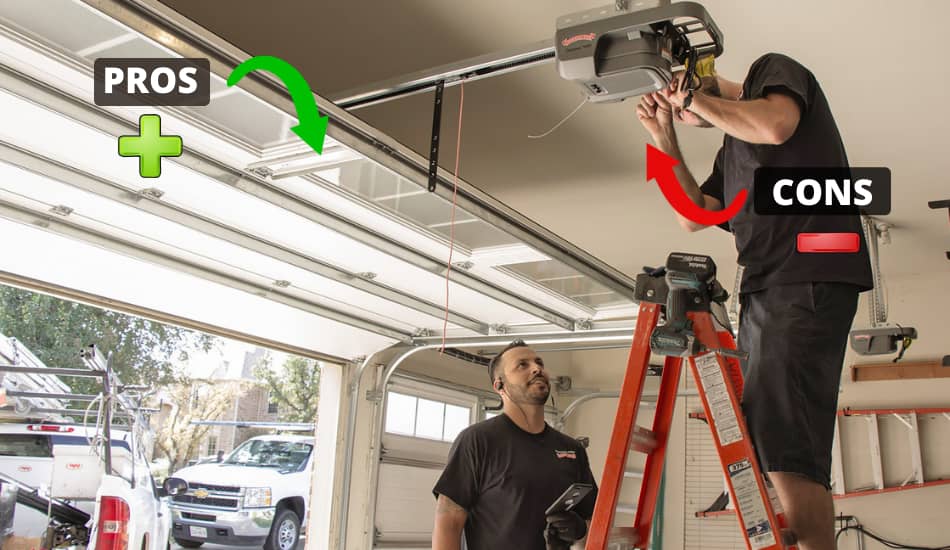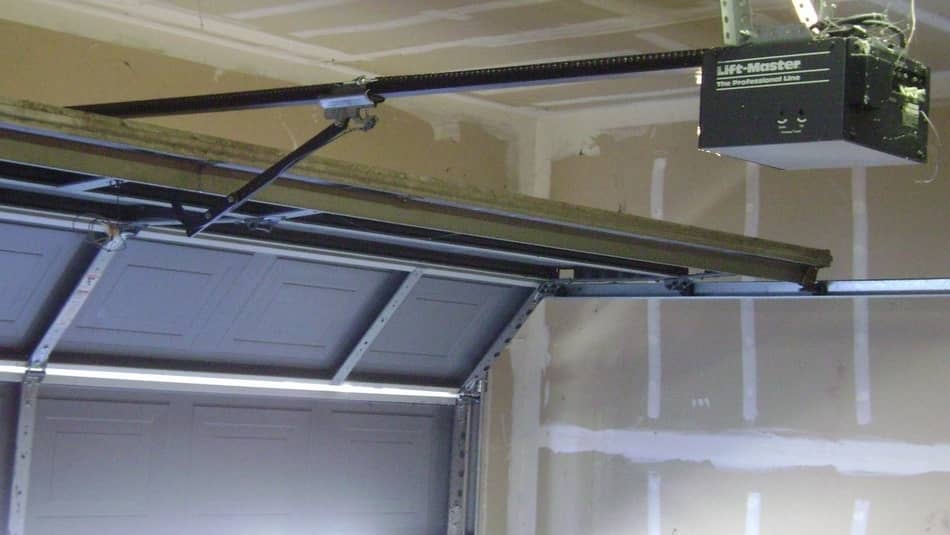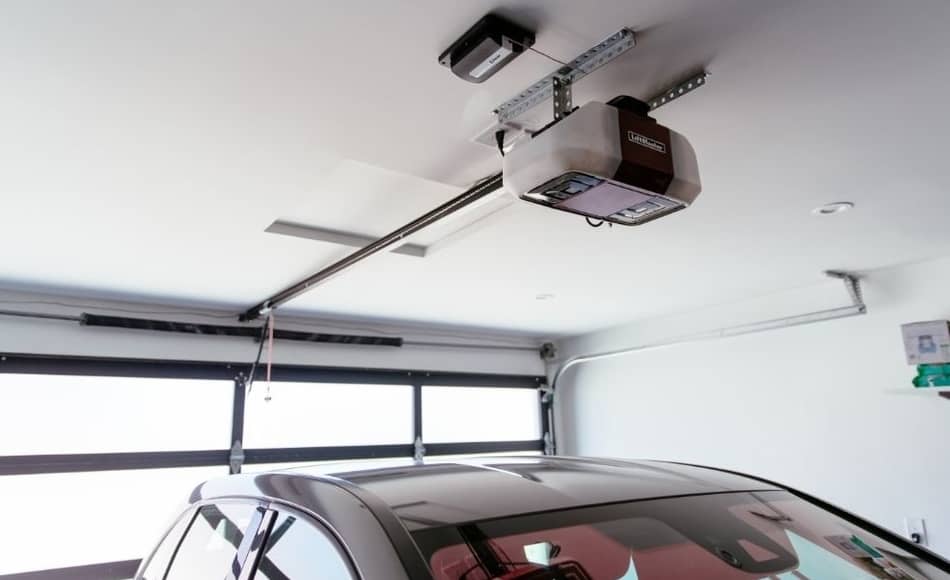The Pros and Cons Of Garage Door Opener

On average, garage door openers are opened and closed around 1,500 times per year. That’s 4 times per day. That says enough about how useful these devices are. Having them in your garage will save you a lot of time and trouble, especially when you need to park your car inside the garage. They come with an electric motor that only needs a few seconds to open or close garage doors.
However, garage doors also have their drawbacks. Their installation cost is high, they require electricity to work, and they need regular maintenance. But when we take all this into account, the question arises whether it is good to have an automatic garage door or not? Some will tell you that they are a must, while others will tell you that they are a big problem. In this article, we’ll talk about the pros and cons of garage door openers. So, let’s start!
| The PROS | The CONS |
|---|---|
| 1. Remote Opening | 1. Installation Cost |
| 2. Manual release | 2. Belt-Driven Doors |
| 3. Security System | 3. No Power |
| 4. Home Automation System | 4. Replacing Batteries |
| 5. Wi-Fi Integration | 5. Possible Repairs |
| 6. Auto-close Option | 6. Regular Maintenance |
| 7. Battery Backup |
For those who want to know more about garage door openers, be sure to read How Much Power (kWh) Does a Garage Door Opener Use?
The Pros Of Garage Door Opener

1. Remote Opening
The great thing about the garage door opener is that you can activate it by using a remote control. They are electric-operated devices that use receivers and transmitters to operate. Garage doors are usually controlled via keypads or buttons that are placed on the wall. By entering a private code, you can open or close them. However, most homeowners use remote controllers to activate the door externally. That way you can open or close doors without leaving the car.
2. Manual Release
Garage doors can also be used manually rather than via remote control. That way, you’ll have the option to raise or lower the doors manually. Most models come with a manual release feature that enables the owner to disengage the garage door from its electric mechanisms. This is great, especially if you want to raise your doors to a certain height at any given time. For example, if you need to do some work inside your garage, the best way is to use the manual release button. That way, you can raise the door only a couple of feet off the ground.
Related Article: How To Fix Garage Door Gaps on Sides
3. Security System
Most garage door openers come with an additional security system. They have a built-in keypad where you need to enter a passcode or use a button. This is very handy if you have a garage that is attached to the house. Also, remote controls use technology that regularly changes the signal (passcode) that prevents burglars and hackers from accessing the code. That way you can be ensured that no one can enter your garage without having a passcode.
4. Home Automation System
Today you can find a lot of homes that are adopting home automation systems. A garage door opener can also be one part of that system. This means that you have the option to open or close your garage door by using a sound command. For example, if you have kids that are playing outside, and you want to let them in, you can use a voice command by Alexa, and the door will open. The possibilities are numerous.
5. Wi-Fi Integration
The garage door opener can also be integrated via Wi-Fi. This is a great feature that many homeowners will welcome. It allows you to control garage doors from anywhere by using your smartphone, tablet, or laptop. For example, if you are at work and need to check the status of your garage doors, just use your smartphone and see if you forgot to close the doors. This is even better than a home automation system because you can control your garage doors from anywhere by using Wi-Fi.
6. Auto-close Option
Did you know that garage door openers also come with an auto-close feature? By using an auto-close function, you can pre-program your garage doors and lower them at a certain time. This means they can be programmed to close five, ten, or thirty minutes later. For example, during summer, you might want to keep your garage door open and close them after you’re parked your car inside.
7. Battery Backup
When you don’t have electricity in your home and at the same time you need to park your car outside the garage, battery backup is a great thing to have. Most modern garage door openers come with built-in battery backup systems. Keep in mind that blackout can be a scary thing. As garage doors require electricity, it is good to have a backup plan like this that will be useful.
The Cons Of Garage Door Opener

1. Installation Cost
We will start with the price of the installation. Garage door openers can sometimes be complicated to install, and in most cases, you’ll need to hire a professional. However, installation costs usually depend on the type and size of the doors. Another thing we should mention is that the garage door opener requires additional batteries that must be replaced every two years. There is also regular maintenance that must be done. Repairs can also be an additional cost that you must keep in mind.
2. Belt-Driven Doors
Garage openers are usually using the belt-driven system to open or close the doors. These belts can be compromised by humidity or extra heat, making the belt slip out of place. However, if you have a temperature-controlled garage, this will not affect you. Also, after some time, you will need to replace the belt, and if you do not know how to do it yourself, you will need to seek professional help. It will be an additional expense.
3. No Power
One of the key disadvantages when it comes to automatic garage doors is the electricity outage. Since electricity is needed for the garage door to work, a power outage could create additional problems, especially if you do not have a battery backup system installed. Older garage door openers don’t have these backups. Therefore, if you don’t have electricity, you’ll need to open and close your doors manually until power is restored.
4. Replacing Batteries
Since most garage door openers come with battery backup systems, they need to be regularly charged. Most of them require a charge every few months which can create an additional obligation. Therefore, if you do not charge the batteries and an electrical outage occurs, you will not be able to use your garage door (except manually).
5. Possible Repairs
Like any other device in our lives, a garage door opener will also need some kind of repair one day, and that’s what scares people. Repairs can be costly and unexpected. They often happen in awkward moments when we don’t have time. This will put us in a situation where we will have to open the garage door manually, making the situation more complicated.
6. Regular Maintenance
A garage door opener requires regular maintenance like any other electrical device in your home. Therefore, you will need to ensure that you have a detailed inspection at least once or twice a year to avoid a major malfunction. It would be advisable to read the manual to see what you need to pay attention to, and thus you will also learn something new, which can save you money.
Final Thoughts
Overall, many homeowners enjoy having automatic door openers in their garages. We can say that they certainly have more advantages than disadvantages, and these disadvantages are more or less negligible if you do regular maintenance that is not so frequent. I hope we have helped you and that you will think twice before deciding on a garage door opener. Good luck!
